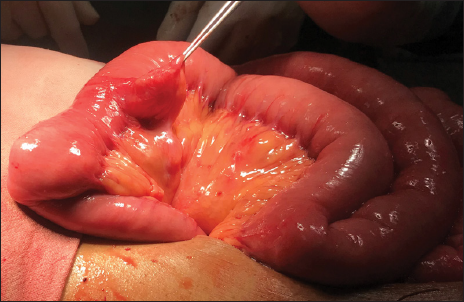Translate this page into:
Incidentally Detected Meckel Diverticulum during Cystectomy: An Unhinging Dilemma?
*Corresponding author: Manjeet Kumar, MBBS, MS, McH, Department of Urology, IGMC, Shimla, HP, India. manjeetkumar.1014@gmail.com
How to cite this article: Kumar M. Incidentally detected meckel diverticulum during cystectomy: An unhinging dilemma? Int J Recent Sur Med Sci, doi: 10.1055/s-0043-1761468
Meckel’s diverticulum is found in 2% of the population, which makes it the commonest congenital abnormality of the gastrointestinal tract. It is diagnosed as an incidental finding during surgery for other reasons. It is found 100 cm from the ileocecal junction, at the antimesenteric border. Other presentations can be abdominal pain, infection, bleeding from ectopic mucosa, recurrent intestinal obstruction, etc. It is formed during the embryonic period due to incomplete obliteration of the omphalomesenteric duct. Treatment of this complication is the removal of Meckel’s diverticulum.[1,2]
Incidentally found Meckel’s diverticulum during urological surgeries is a surgical dilemma. Complications due to the removal of Meckel’s diverticulum could be challenging to manage, at least as mentioned in earlier studies.[3]
Cullen et al in a study reported 6.4% chances of developing complications due to Meckel’s diverticulum on long-term follow-up. When diverticulectomy was done, mortality and morbidity of 2% and 12%, respectively, were noted in these patients. In contrast, mortality and morbidity in incidental diverticulectomy were 1% and 2% respectively. On further analysis, it was found that complications in the incidental surgery group were related to the primary operation or patient fitness rather than diverticulectomy itself.[4]
Park et al recommended resection of Meckel’s in male patients, diverticulum length more than 2 cm, abnormal thickening, or appearance of a diverticulum.[1] Carcinoid tumors were found in Meckel’s diverticulum in 2.1% of asymptomatic patients and 2.2% for symptomatic ones.[5,6]
In the literature, it is clear, especially in the recent literature, there is a move toward resection for all or in those with high-risk factors.[4]
Regarding incidental detection of Meckel’s during urological surgeries, a few case reports are available. Meckel’s has been used during ureteric repair to bridge gap as a part of Mitrofanoff procedure.[7] In other case report Meckel’s has been used to implant ureter after radical cystectomy to the Bricker segment.[8] Another case report used Meckel’s as part of orthotopic neobladder to lengthen the distal part for urethral anastomosis.[9]
Although there is no compelling evidence in the current literature to support prophylactic diverticulectomy for patients with MD, we believe that the removal of Meckel’s should be done in young patients, with suspicious thickness of more than 2 cm diverticulum, especially in patients undergoing radical cystectomy.
In our experience, we encountered two incidental Meckel’s diverticulum during 86 radical cystectomies [Figure 1]. In one patient, Meckel’s was removed as it was located more distally near the ileocecal junction. In another patient, it was left in situ as no abnormality was found. No complications were seen in both patients related to Meckel’s diverticulum. In our view, Meckel’s should be removed if Meckel’s is abnormal, thickened, more than 2 cm, and near the intestinal anastomosis. Complications related to Meckel’s are more difficult to diagnose and manage after radical cystectomy, if they occur, unfortunately.

- Incidentally detected Meckel’s during radical cystectomy.
Funding
None.
Conflict of interest
None declared.
References
- Meckel diverticulum: the Mayo Clinic experience with 1476 patients (1950-2002) Ann Surg. 2005;241:529-33.
- [CrossRef] [PubMed] [PubMed Central] [Google Scholar]
- Meckel’s diverticulum: a systematic review. J R Soc Med. 2006;99:501-5.
- [CrossRef] [PubMed] [PubMed Central] [Google Scholar]
- Surgical management of Meckel’s diverticulum. An epidemiologic, population-based study. Ann Surg. 1994;220:564-8. discussion 568–9
- [CrossRef] [PubMed] [Google Scholar]
- Laparoscopic resection for incidentally detected Meckel diverticulum. World J Gastroenterol. 2008;14:4961-3.
- [CrossRef] [Google Scholar]
- Ureteric replacement with Meckel’s diverticulum. BJU Int. 2007;99:647-50.
- [CrossRef] [PubMed] [Google Scholar]
- Meckel’s diverticulum as the site of implanting ureter to the Bricker segment after radical cystectomy. J Urol. 2003;169:285.
- [CrossRef] [PubMed] [Google Scholar]
- The use of a Meckel’s diverticulum in the creation of an orthotopic neobladder in case of a short mesoileum: a case report. Adv Urol. 2009;2009:493236.
- [CrossRef] [PubMed] [PubMed Central] [Google Scholar]






